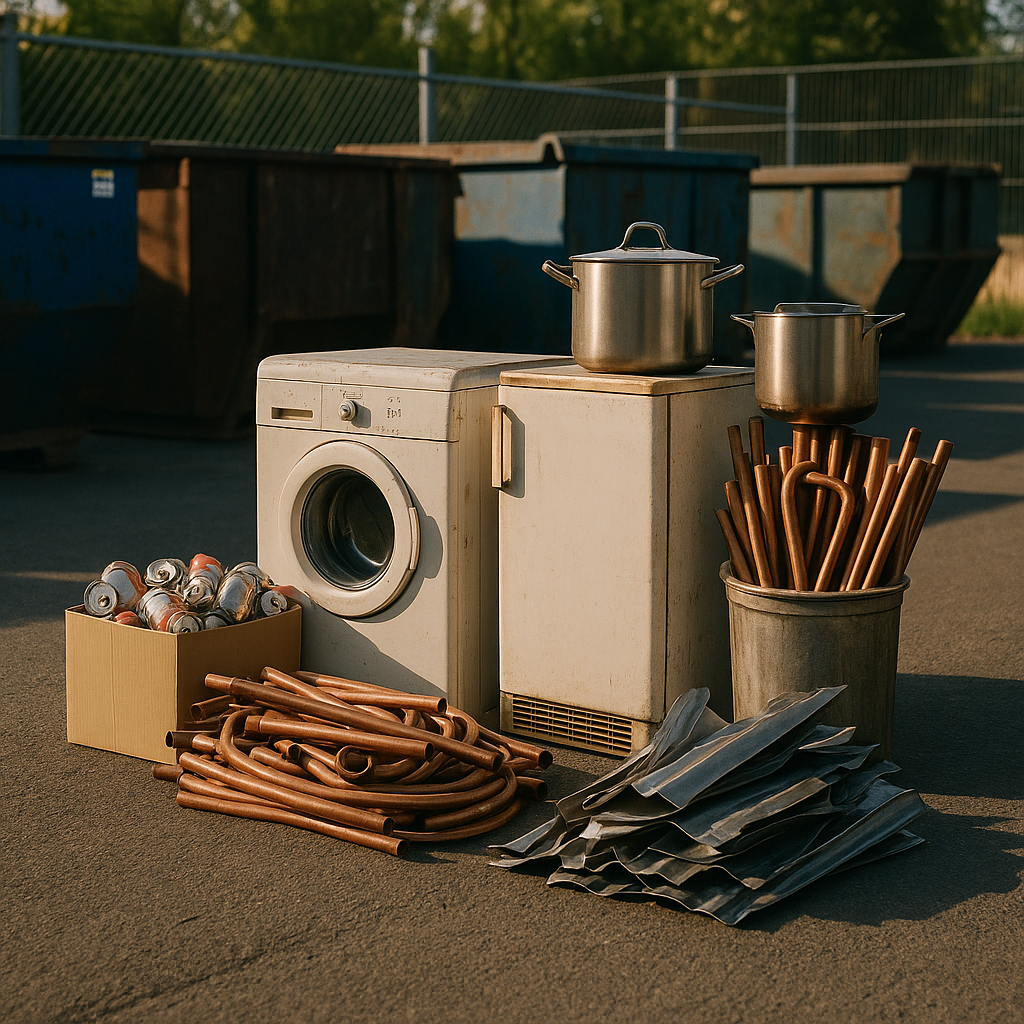5901 Botham Jean Blvd, Dallas, TX 75215
Personalized Scrap Metal Pickup: A Quick Guide for Beginners
August 16, 2025Scrap metal can accumulate quickly in businesses and homes. The bulky, heavy nature of these materials makes disposal challenging. Personalized scrap metal pickup services offer a solution to this common problem.
Personalized scrap metal pickup is a customized recycling service where providers collect metal waste directly from your location at a schedule that fits your needs. These services adapt to specific requirements, whether you’re a manufacturing facility with regular metal byproducts or a homeowner completing a renovation project.
The programs typically include convenient scheduling options, various container sizes to match your volume needs, and straightforward service requests through online portals or simple phone calls. With minimum weight requirements often starting at 500 pounds for non-ferrous metals or 2,000 pounds for ferrous materials, these services are designed for efficiency and convenience.
How Does Personalized Scrap Metal Pickup Work?

Personalized scrap metal pickup offers a streamlined solution for businesses and industrial facilities to manage their metal waste efficiently. The process follows a structured approach designed to maximize value while minimizing disruption to operations.
Initial On-Site Assessment
The process begins with a professional evaluation of your scrap metal recycling needs. A specialist visits your location to assess the types and volumes of metal waste generated. This complimentary assessment helps determine the optimal collection strategy for your requirements.
During this visit, the specialist examines your facility layout, identifies potential challenges, and discusses your production cycles to understand when and where scrap accumulates. This information forms the foundation of your customized recycling program.
Developing a Custom Program
Based on the assessment findings, recycling companies create a tailored plan that addresses your specific needs. This custom program considers factors such as the types of metal generated, production volume, space constraints, and operational schedule.
The program outlines collection frequency, container requirements, and logistical details to ensure smooth implementation. Manufacturing facilities with consistent scrap output might have regular pickups, while project-based operations might opt for on-demand service.
Container Placement and Selection
Once your program is established, appropriate containers are delivered to your location. The container type depends on your specific needs:
- Roll-off containers: Ideal for large volumes of scrap metal, ranging from 10 to 50 cubic yards in capacity
- Recycling dumpsters: Suitable for moderate amounts of regular scrap collection
- Dump trucks: Used for one-time or irregular large collections
- Specialized containers: Designed for specific metal types or production processes
Container placement is strategic, positioned to minimize handling while ensuring easy access for both your team and the pickup service.
Scheduling and Online Management
Modern scrap metal pickup services offer convenient scheduling options through digital platforms. Most companies provide online portals where customers can:
- Schedule pickups when containers reach capacity
- View collection history and documentation
- Access recycling reports and certificates
- Manage multiple locations from a single dashboard
Many services offer flexible scheduling with pickups within 24-48 hours of request, ensuring operations are not delayed by overflowing scrap containers.
Collection and Transport
When pickup time arrives, trained professionals handle the loading and transport of your scrap metal. The team ensures proper handling techniques to maximize safety and efficiency. Some services offer same-day pickup for urgent situations, helping maintain workflow in busy industrial environments.
After collection, your scrap is transported to specialized recycling facilities equipped to process different types of metal. These facilities sort, process, and prepare the materials for reintroduction into the manufacturing supply chain.
Sorting and Processing
At the recycling facility, your scrap undergoes thorough sorting by type and grade. Advanced techniques separate ferrous from non-ferrous metals and remove any contaminants. This meticulous sorting ensures each metal type is processed correctly and maximizes its recycling potential.
Throughout this process, detailed documentation tracks the material from collection through processing, providing transparency and supporting sustainability reporting requirements.
| Roll-Off Containers | Ideal for large volumes of scrap metal |
| Hook-Lift Containers | Used for versatile, easy placement and retrieval |
| Self-Dumping Hoppers | Designed for easy tipping and emptying |
| Tilt Trucks & Carts | Best for small quantities and ease of movement at facilities |
| Specialized Containers | For specific metal types or production processes |
By implementing a personalized scrap metal pickup service, businesses can transform waste management from a logistical challenge into a streamlined, environmentally responsible process that may even generate revenue through the recycling of valuable metals.
What Types of Scrap Metal Can Be Picked Up?

Scrap metal pickup services accommodate a wide range of materials, simplifying recycling for both individuals and businesses. Knowing which types of scrap metal are accepted helps ensure a smooth recycling process and proper recovery of materials.
Ferrous Metals
Ferrous metals contain iron and are typically magnetic. These metals are among the most commonly recycled due to their widespread use in manufacturing and construction. A simple magnet test can help identify ferrous metals in your scrap collection.
Common ferrous metals accepted for pickup include:
- Steel (construction steel, sheet metal, piping)
- Cast iron (old skillets, bathtubs, radiators)
- Iron (railings, fencing, decorative items)
- Wrought iron (gates, furniture, ornamental pieces)
- Heavy melting scrap (HMS)
- Shredded and busheling scrap
Non-Ferrous Metals
Non-ferrous metals do not contain significant amounts of iron and are not magnetic. These metals are usually more valuable per pound than ferrous metals due to their properties and special applications. Non-ferrous metals are prized for their resistance to corrosion and malleability.
Commonly accepted non-ferrous metals include:
- Aluminum (cans, siding, gutters, window frames)
- Copper (wiring, piping, electronics)
- Brass (plumbing fixtures, musical instruments, decorative items)
- Bronze (statues, bearings, hardware)
- Lead (batteries, roofing materials)
- Zinc (die-castings, galvanized items)
Specialty and Alloy Metals
Many scrap metal pickup services also accept specialty metals and alloys designed for specific applications. These materials often command higher prices due to their unique properties.
Specialty metals commonly accepted include:
- Stainless steel (appliances, kitchen equipment, medical devices)
- Insulated copper wire (electrical wiring, extension cords)
- Nickel and nickel alloys (industrial equipment)
- Various alloys (tool steels, high-temperature alloys)
- Carbide (tool bits, drill bits)
- Titanium (when available from industrial sources)
Most scrap metal pickup services sort materials by type to ensure proper recycling and accurate pricing. Professional recyclers use specialized equipment to process different metal types efficiently and prepare them for reuse in manufacturing.
| Copper | Electrical wiring, plumbing, roofing | Highly conductive, corrosion-resistant |
| Aluminum | Cans, siding, car parts | Lightweight, versatile |
| Brass | Plumbing fixtures, musical instruments | Durable, copper-zinc alloy |
| Steel | Appliances, construction, vehicles | Highly recyclable |
| Tin/Light Iron | Cans, thin metal sheets | Lightweight |
| Non-Ferrous Metals | Plumbing, electrical wires, window frames | Non-magnetic, high resistance to rust |
| Ferrous Metals | Construction, automotive, industrial | Magnetic, mostly composed of iron |
Before scheduling a pickup, it is advisable to separate your scrap metals by type if possible. This pre-sorting can sometimes result in better pricing and helps make the recycling process more efficient. When in doubt about a particular item, contact your local scrap metal recycler to confirm whether they accept specific materials.
What Are the Benefits of Personalized Scrap Metal Pickup?
Personalized scrap metal pickup transforms waste management from a routine expense into a strategic advantage for businesses. Tailored to your specific operational needs, these services offer numerous benefits beyond simple disposal, adding value across your organization.
Operational Convenience and Efficiency
The immediate benefit of personalized pickup is the elimination of logistical headaches. Instead of managing the transportation, handling, and processing of scrap metal yourself, a dedicated service takes care of these tasks. This convenience directly improves workflow.
Scheduled pickups prevent the accumulation of materials that can cause workspace congestion and safety hazards. Manufacturing facilities typically report a 10-15% improvement in usable workspace efficiency after implementing strategic collection points with properly sized containers. This reclaimed space can then be used for productive activities rather than material storage.
Time savings are another significant advantage. Staff members no longer need to transport materials to recycling facilities, allowing them to focus on core business activities. According to workplace safety research, facilities with proper material handling procedures see a 40-70% reduction in related injuries.
Financial Advantages
Personalized pickup services create financial benefits in several ways. They transform what was once a waste management expense into a potential revenue stream. Materials headed for the landfill can bring valuable returns when properly sorted and processed.
Many services provide transparent pricing based on commodity indexes, allowing businesses to establish predictable cash flows. This transparency aids financial planning and budgeting, especially for operations that generate consistent volumes of recyclable metals.
Some providers even offer cash advances for large projects, improving cash flow during extensive renovations or manufacturing runs. This arrangement is especially valuable for construction and demolition projects where significant metal volumes are generated before project completion.
Cost avoidance is another financial benefit. Businesses reduce expenses related to waste disposal, transportation, and handling. According to industry data, manufacturing facilities can recover between 15-20% of material costs through effective recycling programs.
| Financial Benefit | Description |
|---|---|
| Cost Savings | Reduces landfill disposal costs by diverting scrap metal for recycling. |
| Revenue Generation | Provides additional income through the sale of valuable metals. |
| Transparent Pricing | Uses market-based pricing to ensure fair compensation for scrap metal. |
| Cost Avoidance | Reduces expenses related to waste disposal, transportation, and handling. |
| Cash Flow Improvement | Offers cash advances for large projects to enhance liquidity during operations. |
Environmental Sustainability Impact
Personalized pickup services ensure proper recycling of valuable materials, creating significant environmental benefits. Metal recycling dramatically reduces energy consumption compared to primary production. For example, aluminum recycling uses 95% less energy than primary production, while steel recycling reduces energy consumption by approximately 60%.
These efficiency gains result in lower carbon emissions. Recycling aluminum saves approximately 9 metric tons of CO₂ per ton recycled, while steel saves about 1.5 metric tons. For businesses with sustainability goals, these metrics provide verifiable data for sustainability reporting.
By participating in metal recycling, businesses actively contribute to a circular economy where resources are continually reused instead of extracted. This approach minimizes waste and reduces the need for mining raw materials, which can significantly harm the environment through habitat destruction and water pollution.
Customized Container Solutions
Personalized pickup services provide appropriately sized containers tailored to your specific generation patterns and space constraints. This customization ensures efficient collection without excessive space requirements.
Options typically include roll-off containers for high-volume operations, tilt hoppers for production lines, and specialized secure containers for high-value materials. The right container configuration optimizes material segregation while adapting to your operational patterns.
Strategic container placement near points of scrap generation minimizes internal handling and improves sorting accuracy. Studies of manufacturing facilities show that employees typically won’t travel more than 20 feet to dispose of small scrap items, making proper container positioning essential for program success.
Regulatory Compliance and Documentation
Professional pickup services help businesses navigate increasingly complex waste management regulations. They provide complete documentation, including material movement records, certified weight documentation, and processing facility verification.
This paperwork is particularly valuable for businesses with environmental management systems or those working under certification requirements. It reduces the risk of potential citations and penalties, which can exceed $10,000 per violation in some jurisdictions.
Specialized handling protocols for sensitive or proprietary components further enhance compliance. Professional services offer certified destruction when required, proper management of coated or treated metals, and appropriate processing of mixed-material items.
Enhanced Brand Reputation
Implementing a personalized scrap metal pickup program demonstrates your commitment to environmental stewardship. This visible sustainability initiative can strengthen relationships with environmentally conscious customers, partners, and communities.
According to recent industry surveys, over 70% of industrial customers now consider environmental practices when selecting suppliers. Documented recycling programs provide tangible evidence of your sustainability efforts, helping differentiate your business in competitive markets.
For businesses in environmentally conscious communities, demonstrated sustainability commitments enhance their reputation and community standing. These elements contribute to a stronger brand reputation and can support broader corporate environmental goals.
Conclusion: Streamlining Your Scrap Metal Recycling Process

Personalized scrap metal pickup services enhance the recycling experience by offering tailored solutions to meet specific needs. These services eliminate logistical challenges while maximizing the value of discarded metals. For businesses and individuals, customized pickup schedules, specialized containers, and fair compensation create an efficient path to responsible waste management. The accessibility of these services makes sustainable practices both environmentally friendly and financially beneficial.
With environmental considerations becoming increasingly vital in resource management decisions, personalized scrap metal recycling offers a practical solution that benefits both users and the planet. Reducing landfill waste, conserving natural resources, and decreasing energy consumption are significant steps toward a more sustainable future. For all your metal recycling needs, contact Okon Recycling at 214-717-4083.
